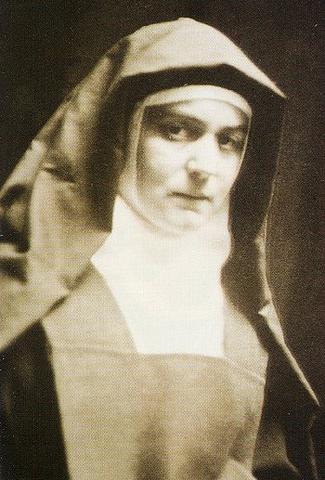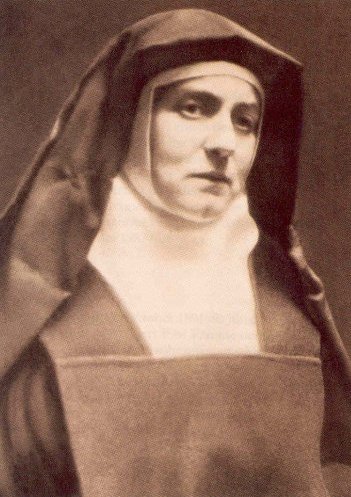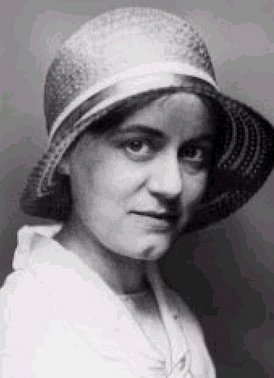August 9, 2012
-
…the Truth and Nothing but the Truth, so Help Me God…
Seventy years ago today, in a gas chamber at Auschwitz, a remarkable woman died.
Please say hello to St. Teresa Benedicta of the Cross, a Carmelite nun.


You might be asking yourself, “Now why would the Nazis want to gas a cloistered Carmelite nun who wasn’t doing them any harm?”
Well that is because, like all nuns, monks, brothers, sisters and priests, they had a life before God called them. Before she was a nun, she was Edith Stein.




Edith Stein was born in 1891 to an observant Jewish family in Germany. By the time she was a teenager she was a firm atheist in spite of the strong and traditional example of faith given by her mother that she herself admired greatly. The death of her father when she was two years old proved to great a challenge to her and in spite of her mother’s efforts she gave up prayer and the practice of religion altogether. She went on in life to serve as a nurse in an Austrian field hospital (the tyhpus ward to be precise) and then to receive a doctorate in philosophy from the University of Göttingen, her dissertation being done under the tutelage of Edmund Husserl, a philosopher famous for founding the school of thought known as “phenomenology,” which promotes the idea that all knowledge is based primarily in our own experience. She had a strong desire to know the truth of things and saw philosophy as the way to seek the truth and understand reality is it really was. She was a sort of pioneer in the world of higher education, being part of the earliest efforts to break through the glass ceiling that kept women from becoming full professors and holding other levels of leadership in a university setting.
(Edith Stein as a nurse during WWI)
It was, however, her encounter with an elderly woman in a Catholic Church that changed everything. A biographical account provides the following:
“During this period she went to Frankfurt Cathedral and saw a woman with a shopping basket going in to kneel for a brief prayer. “This was something totally new to me. In the synagogues and Protestant churches I had visited people simply went to the services. Here, however, I saw someone coming straight from the busy marketplace into this empty church, as if she was going to have an intimate conversation. It was something I never forgot.”
A visit with the widow of a friend, whose husband had died at Flanders in WWI, poured what waters of grace on the seed planted in that empty church. The woman and her husband had been Jewish converts to Protestantism, and though Edith was nervous about meeting her friend’s young widow, she was surprised at the woman’s faith and wrote:
“This was my first encounter with the Cross and the divine power it imparts to those who bear it … it was the moment when my unbelief collapsed and Christ began to shine his light on me – Christ in the mystery of the Cross.”
“Things were in God’s plan which I had not planned at all. I am coming to the living faith and conviction that – from God’s point of view – there is no chance and that the whole of my life, down to every detail, has been mapped out in God’s divine providence and makes complete and perfect sense in God’s all-seeing eyes.”
A few years later she spend a summer with a friend who had also converted to Protestantism from Judaism. While there Edith happened upon the autobiography of St. Teresa of Avila and spent the entire night reading the whole thing. When she had finished the book she said to herself, “This is the truth…my longing for the truth was a single prayer.”
Edith Stein was baptized into the Catholic Church on January 1st of 1922, saying, “I had given up practicing my Jewish religion when I was a 14-year-old girl and did not begin to feel Jewish again until I had returned to God. She expressed a continual awareness that she belonged totally to Christ not only spiritually, but by blood as well since both she and the Christ she loved were Jewish. Though she wanted to join a Carmelite monastery immediately–no doubt inspired by St. Teresa, she was discouraged from doing so and thus continued on with her career in academia. She taught at a school in Speyer from 1923-1931.
In 1932 she because a lecturer at the Institute for Pedagogy at Münster but soon afterward new laws, passed by the Nazi government in Germany, made it so that people of Jewish descent could not teach in schools, and thus she was forced to resign in 1933. She wrote:
“I had heard of severe measures against Jews before. But now it dawned on me that God had laid his hand heavily on His people, and that the destiny of these people would also be mine.” The Aryan Law of the Nazis made it impossible for Edith Stein to continue teaching. “If I can’t go on here, then there are no longer any opportunities for me in Germany,” she wrote; “I had become a stranger in the world.”
Having received permission to enter the Carmelite Order, Edith met with the prioress of the convent in Cologne, saying to her, “Human activities cannot help us, but only the suffering of Christ. It is my desire to share in it.”
A few years after she received her habit and religious name, she wrote:
“I understood the cross as the destiny of God’s people, which was beginning to be apparent at the time (1933). I felt that those who understood the Cross of Christ should take it upon themselves on everybody’s behalf. Of course, I know better now what it means to be wedded to the Lord in the sign of the cross. However, one can never comprehend it, because it is a mystery.”
(Edith Stein just before receiving her habit and religious name)
“Those who join the Carmelite Order are not lost to their near and dear ones, but have been won for them, because it is our vocation to intercede to God for everyone.” In particular, she interceded to God for her people: “I keep thinking of Queen Esther who was taken away from her people precisely because God wanted her to plead with the king on behalf of her nation. I am a very poor and powerless little Esther, but the King who has chosen me is infinitely great and merciful. This is great comfort.”
On New Year’s Eve in 1938 Sr. Teresa was smuggled out of Germany into the Netherlands in an effort to save her from being taken away by the Nazis. She wrote in her will a year and a half later:
“Even now I accept the death that God has prepared for me in complete submission and with joy as being his most holy will for me. I ask the Lord to accept my life and my death … so that the Lord will be accepted by His people and that His Kingdom may come in glory, for the salvation of Germany and the peace of the world.”
About two years later, in 1941, she wrote to a friend in an almost prophetic way:
“One can only gain a scientia crucis (knowledge of the cross) if one has thoroughly experienced the cross. I have been convinced of this from the first moment onwards and have said with all my heart: ‘Ave, Crux, Spes unica’ (I welcome you, Cross, our only hope).”
For a year later, on August 2nd, 1942, the Gestapo came to the convent to arrest her and her sister, Rosa, who had also become Catholic and was serving the nuns of the convent. The last words that anyone heard Sr. Teresa say were to her sister, “Come, we are going for our people.”
She and her sister were deported to Auschwitz on August 7th along with over 900 other Jews taken from the Netherlands in response to a letter written by the Dutch Catholic Bishops against the Nazi treatment of Jews. Jews who had converted to Christianity had, up to that point, been for the most part spared, but the boldness of the Dutch bishops spurred the Nazis into retaliation. While there are no records to absolutely confirm this, she is believed to have been executed in the gas chambers of Auschwitz on this day, August 9th or 1942.
A professor who knew her well wrote later, “She is a witness to God’s presence in a world where God is absent.”
St. Teresa fell in love with the Truth–Jesus Christ–after a lifelong pursuit of Him, and thus came to follow His Way to everlasting Life.
St. Teresa Benedicta of the Cross, pray for us.

Post a Comment
Leave a Reply
You must be logged in to post a comment.
Comments (15)
Very interesting. Thank you for posting this.
This reminds me of a book that I was recently recommended called “The Hiding Place” by Ten Boom Corrie. She lived through life in a concentration camp and had a really positive attitude towards the experience (which most people would find traumatizing). Note – I haven’t read the book yet, so I apologize if my synopsis is a bit off, but I’m hoping that it will be good.
It always amazes me the stories of people of such faith.
philosophically she is important for being the secretary of Professor Husserl who developed Existential Humanism. She produced Husserl’s books, even translating them into Polish. Pope John Paul II developed thiHusserl’s philosophy into his own Existential Personalism which now is one of 3 philosophical outlooks acceptable to Catholics: Aquinas, Duns Scotus, and Pope John Paul II. It was he who canonized Edith Stein. …And they say it’s what you know, not whom you know !
I wonder how Hitler would have turned out if he was allowed to attend art school? Just a philosophical obsservation. =)
“She is a witness to God’s presence in a world where God is absent.”If this is meant to suggest nazi germany was a very secular place (as evangelists often do), 96.4% of the people in germany under the nazis were christian.
@agnophilo - I think what was meant by the man’s comment on God’s absence is that while many people in Germany identified as being Christian, in the world of the concentration camps it probably seemed that God was glaringly absent. He could have also been referring just to the horrific phenomenon of World War II as being a time when the whole world seemed almost “Godless.” I’m leaning more toward my first thought.I agree with you, though; far too many people make the generalization that Germany was a country made up entirely of super-secular people, as though the whole country were atheist. While a number of the higher-up government officials may have been (who knows what some of them were or thought themselves to be!), and while the Nazi party certainly didn’t encourage or incorporate many Christian principles, it really is a glaring error to consider Nazi Germany to have been atheist or overly secular, and I don’t think that the author of the comment you are quoting intended to say that.
@Ancient_Scribe - I believe only a few nazi officials were not christian. In the sense you are talking about of not being good christians or “true” christians, I’m sure they would say the same about you. And I agree that it could’ve meant something else, I was just putting that there to set the record straight if that was the intention. There’s a vast wealth of bigotry and lies in print about atheists in america, much of it centering around a false narrative of the holocaust.
Great story! I wonder if she lived nowadays what was her attitude to CNLs (clinical nurse leaders)?Here is some info about nursing leadership: http://www.bestessay.com/essays/nursing-leadership.php
@Ionyz - I’m sure she wouldn’t have any problem with clinical nurse leaders…
In truth breathtaking job with the blog. I do approximating your stiff exertion and will hang around for more post from you as post gave me delight and gives some helps to do same work. Thanks a lot…………………………write term paper
Truly remarkable labor with the blog. I do like your inflexible service and will wait for more post from you as post gave me gratification and gives some helps to do same work. Thanks a lot…………………………plagiarism prevention
I’m definitely coming again to see these articles and blogs.arbor education and training
Pretty! It was really a wonderful blog. Thanks for the provided information.education and training for a teacher
The gorgeous post learned a great deal Thanks greatly!certifications